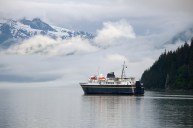The search is underway for missing people following a ferry collapse. Dozens of people are dead and more than a hundred are missing following the deadly accident.
Here's what we know so far. The incident happened in the Congo. An overloaded ferry ended up capsizing in the Burisa river on Friday.
According to Ingende resident Ndolo Kaddy, the ferry contained "more than 400 people because it made two ports, Ingende and Loolo, on the way to Boende, so there is reason to believe there were more deaths."
Nesty Bonina, a member of the local government, blamed the government for the tragedy. Nesty said that the government has not stepped in and cracked down on overloaded ferries. "How can a ship navigate at night under the watchful eye of river service agents? And now we're recording over a hundred deaths," Bonina said.
Ferry Accident Kills 38
Following the capsized ferry, authorities retrieved the bodies of 38 people from the water. Currently, more than 100 people are missing. According to official reports, people were headed home for Christmas on the ferry. That's when it ended up capsizing in the river on late Friday evening. At the time, the shipping vessel was heading in the northeast section of the Congo. There were other ships in its convoy as well. According to Joseph Joseph Kangolingoli, the mayor of Ingende, the ferry mainly contained merchants headed home.
The ship last stopped in Ingende before capsizing.
Search and rescue crews ended up rescuing more than 20 people from the water. It's not the first that something like this has happened. Just 4 days prior, a ferry sank and killed 25 people. Officials have warned against overloading ferries in the water. They've vowed to have strict punishments for those caught doing it. However, the issue of overloaded ferries remains prevalent. The ferry issue is that there are many people depending on the ships for transport. They live in remote areas with few roads.
We'll see if officials step in and start to crack down on the issue. If not, it's like that this ferry won't be the last to sink in the area.




